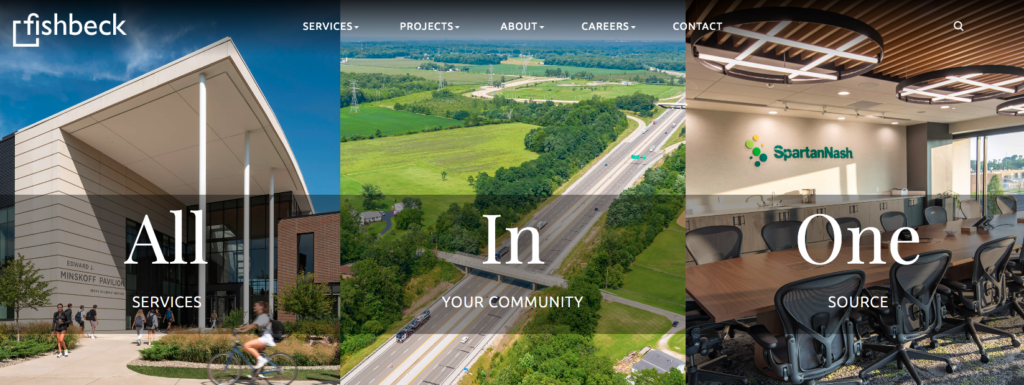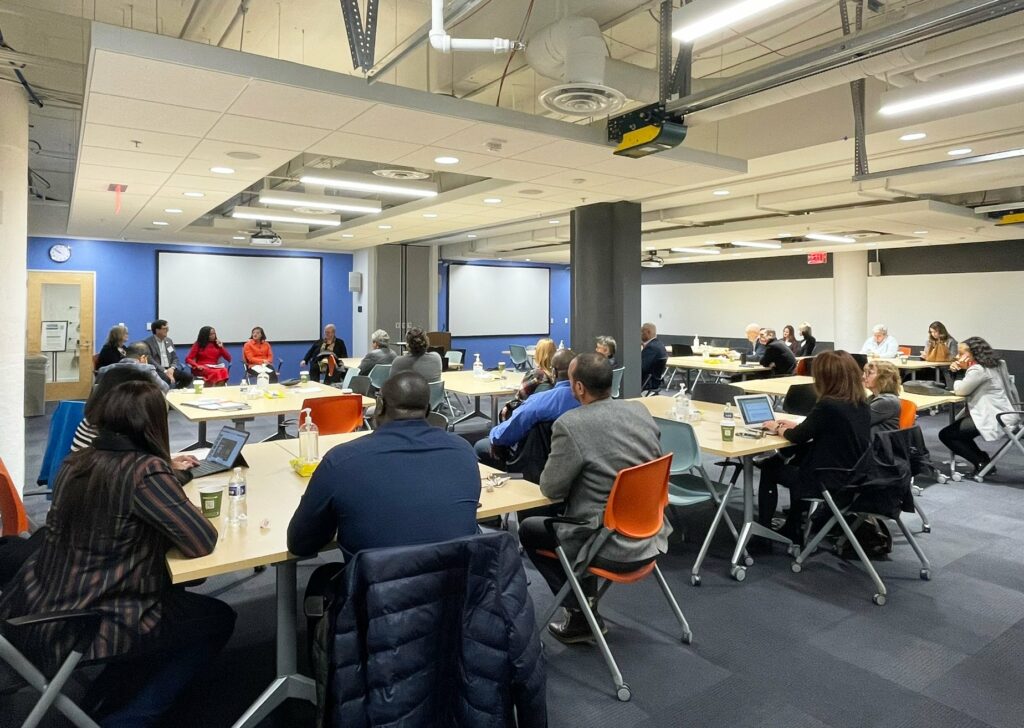Fishbeck: Working to Keep Natural Resources in Focus

Fishbeck is a 67-year-old consulting firm focused on engineering, environmental sciences, architecture, and construction management with ten offices in Michigan, four in Ohio, and one in Indiana. We spoke to Senior Engineer Lillian Woolley about the company’s internal sustainability practices, as well as their clients. Q: What would you like us to know about Fishbeck? A: Our goal is to provide all-in-one solutions to clients and to do that, we have many technical professionals completing a wide variety of work. Our technical staff has worked on some great projects for clients to support client sustainability initiatives, and I think that many Fishbeck employees enjoy those types of projects the most. Our technical teams like the challenge of pulling off a project that is considered a “win-win,” and we often get the opportunity to do that. One of my favorite projects that we facilitated was the construction of a solar garden on a brownfield site in Cadillac, Michigan. Q: Has Fishbeck always had a focus on sustainability? A: Fishbeck started as a civil engineering firm that worked on water and wastewater treatment system projects more than 67 years ago. Over the years, different disciplines have been added, including environmental engineering, but there has always been a strong focus on helping preserve and enhance the natural resources around us. Fishbeck employees are active in several organizations like the 2030 Districts, U.S. Green Building Council, and more. Q: Do you have an internal sustainability team? A: We have a Sustainability Committee comprising representatives from most departments. Beyond the work we do for our clients, the Sustainability Committee considers firm-specific sustainability issues from an employee’s point of view, as well as from the point of view of the general public. The committee has recently released a survey inside the firm to gauge interest and benchmark sustainability efforts. Using that data, they will present a plan for becoming an even more sustainable organization. Your website says Fishbeck’s core purpose is to help people realize their visions while benefiting society. Can you tell us more about that? A: Most Fishbeck employees want to work on technically challenging projects that leave the world – or their client – in a better place after the project is finished. For example, Fishbeck is working with the Kent County Department of Public Works on its Kent County Sustainable Business Park. Kent County has an ambitious goal to “Reimagine Trash” and to divert 90% or more of its trash from the landfill before 2030. The new sustainable business park will include facilities to recycle solid waste. Our civil engineers designed the site work and utilities, while others designed the stormwater management system. Our environmental team is working on the wetlands permit and other environmental permits. Who wouldn’t love to work on a project so promising? Q: Fishbeck achieved a Wildlife Habitat Council (WHC) Conservation Certification for its office headquarters in Grand Rapids. Tell us about this. A: Fishbeck’s Grand Rapids Office is truly beautiful and includes more than 6 acres of wetlands. There is a large pond and, depending on the time of year, you can see all kinds of birds and other wildlife! To become certified and to document our commitment to being good environmental stewards, Fishbeck ecological professionals surveyed the site, outlined a baseline inventory, and then implemented a plan to enhance the habitat. We recently had a Girl Scout troop come to our office to make bat houses, which we will install at the site. Q: What are examples of your internal sustainability initiatives and goals? A: Not only do our architects work with clients on LEED certification, but the Grand Rapids office buildings and landscape management are certified by the Leadership in Energy and Environmental Design (LEED) rating system. As part of its LEED certification, Fishbeck implements best management practices to benefit adjacent ecosystems. Our Facilities Department unveiled a new recycling program earlier this year, including a compost program. They are also reviewing the downstream impact of our programs and processes. The company has a hybrid work policy so employees can work from home. We are each given 8 hours of volunteer time to use during work hours during the year. Our 17 office buildings have smart systems that turn off lights and lower heat when employees are not in the office. Q: What are some examples of client work that involve sustainability in Southeast Michigan? A: Fishbeck has worked with clients in Southeast Michigan on stormwater management projects, others on boiler or HVAC systems to reduce energy consumption, as well as work on a potential recycling facility. A few years back, we were doing a lot of energy assessments, and we are excited to be doing projects now identified in those assessments. Q: How important is choosing partners and suppliers that also have a sustainability focus? A: Scope 3 greenhouse gas emissions can be much higher than Scope 1 and 2 emissions, so paying attention to partners and suppliers is important. I encourage my clients to have a good understanding of their carbon footprint to ensure that when making changes they are moving in the right direction. It is fairly easy to switch suppliers and double your footprint if you are not careful. Q: What are your biggest challenges when it comes to sustainability? A: Communications. In many cases, the most sustainable approach may be cost-effective, but it takes time and effort to make those projects happen. You need to be knowledgeable about available grants and rebates. You need to understand all options available, and you need to be able to communicate the benefits to all affected stakeholders. We make an effort to ensure we look at every option as well as advise our clients on making the best decision for the environment. Q: What are the biggest opportunities? A: The biggest opportunities are available in performing energy assessments and ensuring your facility is operating at its most efficient. This is because both utilities in Southeast Michigan offer rebates and similar programs allowing
The Role of Businesses in Sustainability

A sustainable Great Lakes region cannot be achieved without the leadership, involvement, and commitment of businesses. From decarbonization and the circular economy to water stewardship and workforce development, businesses across all industries and sizes have a unique opportunity to make decisions and investments that impact the region On October 31, the Sustainable Business Network of Detroit (SBND) and the Council of the Great Lakes Region (CGLR) held a jointly organized event to hear from business leaders who share a commitment to sustainable development and learn about the actions they are taking to embed sustainability in their operations and corporate strategies. Discussion focused on the role of businesses in sustainability, measuring the data, automation, and workforce development. The panelists were: Edna Lorenz, energy director for Corewell Health. Mark Schrupp, executive director, the Detroit/Wayne County Port Authority. Lillian Woolley, senior chemical engineer, Fishbeck. Shanelle Jackson, senior manager for State Government Relations for LyondellBasell. Colin Bird, Consul General of Canada in Detroit, also participated as a special guest. Takeaways follow: Bird: This region really is the epicenter of North America, and we have the ability to become the green economy that powers the world and addresses climate change issues around the globe. Wolley: Regarding the role businesses have in sustainability, I think every business and industry is different. Businesses certainly need to support the efforts the state has committed to, and there are programs and utility rate breaks available to help. Shrupp: Businesses will do what is in their interest financially. Five years ago, businesses were largely not engaged in sustainability, but they are at the table now because government entities – and their customers – have made it a priority. Jackson: I think employees today want to be proud of the company they work for and are demanding more and more from companies regarding their sustainability commitments. Shrupp: The Port of Detroit is the linchpin of manufacturing in the city. Heavy industry comes in here and that’s been a huge cost to the environment and air quality. We are developing a decarbonization plan now and we hope to create the greenest port in the Great Lakes and act as an example for others. Jackson: When it comes to sustainability, we are engaging employees at every level from the factories to the C-suite, and having the conversations. Woolley: When it comes to metrics there are companies that are good at it and companies that don’t know what they should be looking at. There are lots of tools available to help though. Lorenz: One of our 2024 initiatives is water. Not just the water we drink but the water we wash our hands and bedding and dishes in. Hospitals utilize water for heating and cooling and there is chemical treatment of that water. This is a big initiative for us in 2024. Shrupp: Working in a port region is a dirty job. The air quality is bad. We are working to raise the level of standard and pushing that agenda throughout the industry. Jackson: I’ve been hearing women and people of color are saying we’ve seen a decline when it comes to DE&I. There was a push for it in 2020 (and before) but was it a thing of the moment? Lorenz: I think healthcare is embracing automation. We have robots delivering food to patients and robots making food. The industry is utilizing software and AI solutions to supplement human staff so that human staff is better able to focus their attention on the data analysis piece. Jackson: Our top goal is to help end plastic waste so we need the latest technology to do that. LyondellBasell is consistently investing in opportunities to increase innovation in ways that will ultimately save us money. Shrupp: There is a lot of work to be done. We need more young people to choose to live in this region and help our businesses transition. Millennials are raising the importance and demand for sustainability. Be sure to subscribe to our newsletter for regular updates on sustainable business practices in and around Detroit.


